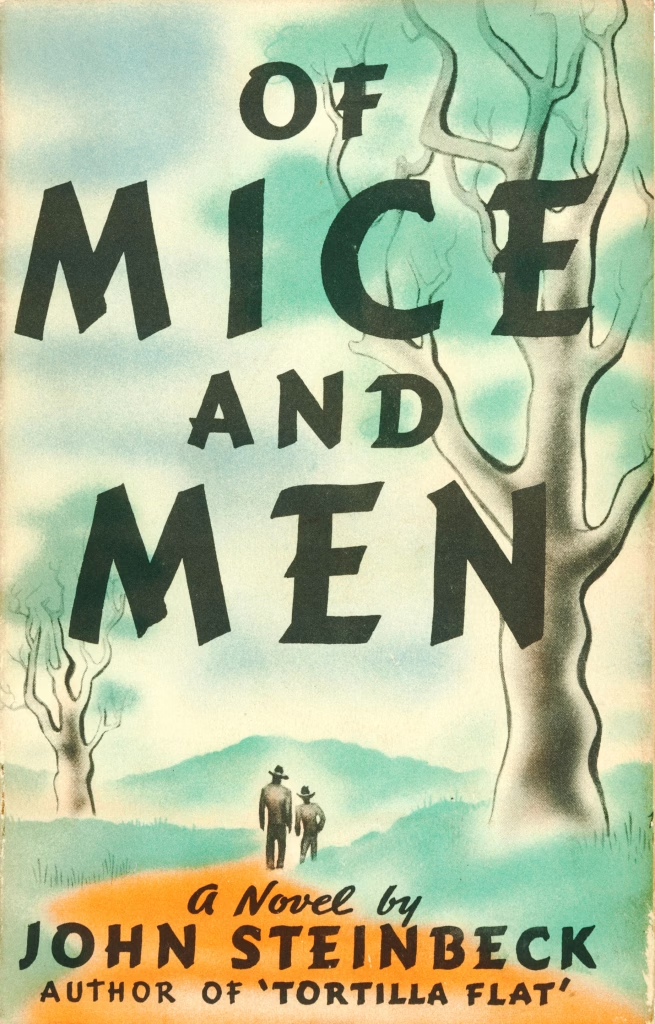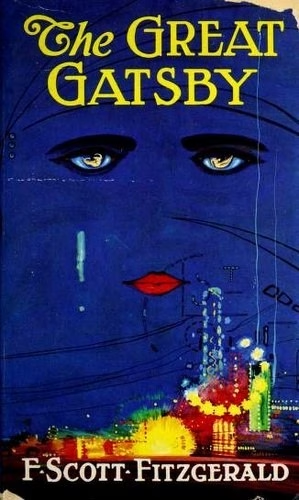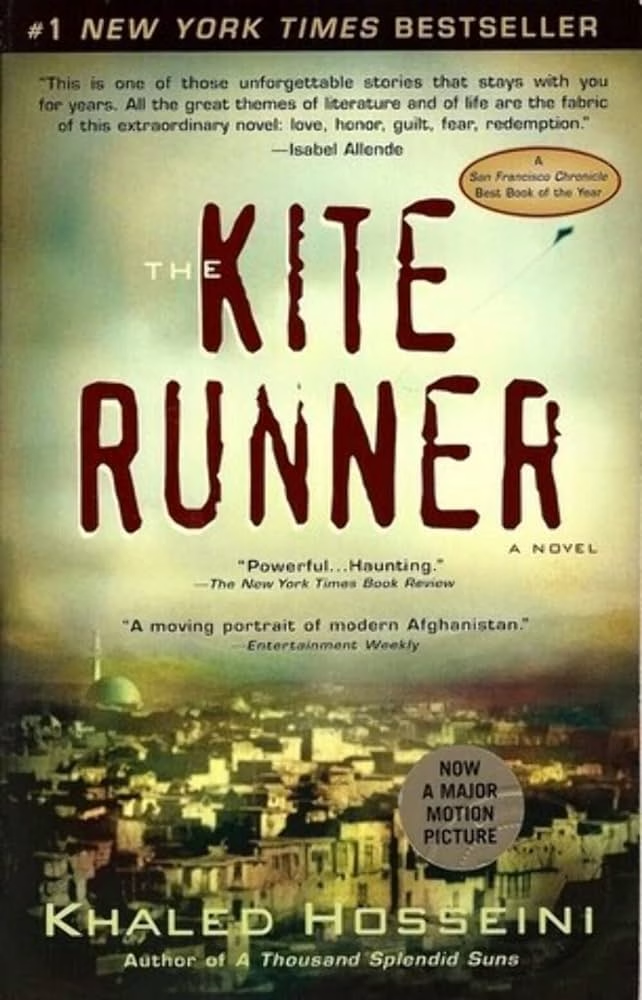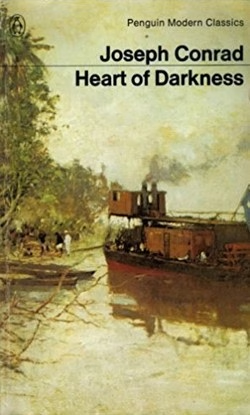Plot Summary
The Brush by the River
The story opens by a tranquil pool on the Salinas River, a few miles south of Soledad, California. Two migrant workers, George Milton and Lennie Small, are on their way to a new ranch for work. George is small, intelligent, and quick-witted, while Lennie is his opposite: a giant of a man with immense physical strength but a childlike, simple mind. It quickly becomes clear that George acts as Lennie’s guardian. Lennie has a fascination with petting soft things, which has repeatedly gotten them into trouble. They were forced to flee their previous job in the town of Weed after Lennie, wanting to feel a girl’s soft dress, frightened her, leading to accusations of rape.
As they rest by the river, George rehearses their plan for arriving at the new ranch: Lennie is to remain silent to hide his mental disability. Their conversation reveals a shared dream: to one day buy a small piece of land, a farm of their own, where they can “live off the fatta the lan’.” On this farm, Lennie’s sole responsibility would be to tend the rabbits. This dream is their source of hope and what distinguishes them from other lonely migrant workers. Before they sleep, George makes Lennie promise that if he ever gets into trouble again, he will return to this hiding place in the brush and wait for him.
Arrival at the Ranch
The next day, George and Lennie arrive at the ranch and meet the other workers. They are introduced to Candy, an aging swamper with one hand who is accompanied by his old, decrepit dog. They also meet the boss, who is suspicious of their relationship, and his son, Curley. Curley is a small, aggressive man with a Napoleon complex who immediately dislikes the massive Lennie. He is newly married and intensely jealous, constantly searching for his flirtatious wife. George warns Lennie to stay away from Curley and his wife at all costs.
Despite the tense atmosphere, they also meet Slim, a highly skilled and respected jerkline skinner whose authority is unquestioned on the ranch. Slim is thoughtful and perceptive, and he expresses admiration for the close bond between George and Lennie, noting how rare such companionship is. His dog has just had a litter of puppies, and he offers one to Lennie, who is overjoyed. Another ranch hand, Carlson, complains about the foul smell of Candy’s old dog, suggesting that it should be put out of its misery.
A Dream Expanded and a Hand Crushed
That evening, Carlson relentlessly pressures Candy to let him shoot the old dog. Slim agrees with Carlson, stating that the dog is suffering and has no quality of life. Defeated and heartbroken, Candy relents. Carlson takes the dog outside, and a single gunshot echoes through the silent bunkhouse.
Later, George confides in Slim, explaining the story of what happened in Weed and how he came to look after Lennie following the death of Lennie’s Aunt Clara. The conversation is interrupted when George, talking to Lennie, begins to describe their dream farm in vivid detail. Candy overhears them and, seeing a chance to escape his own bleak future of being cast aside once he is too old to work, offers his life savings—$350—to join them. With Candy’s money, the dream suddenly becomes an achievable reality. The three men are filled with a sense of wonder and excitement, believing they can buy the farm within a month.
Their celebration is shattered when Curley bursts in, looking for his wife. Seeing Lennie smiling at the thought of the rabbit farm, Curley assumes Lennie is laughing at him and attacks.
* The Attack: Curley throws a series of punches at Lennie’s face.
* Lennie’s Restraint: Terrified, Lennie does not fight back, crying out for George to make it stop.
* George’s Command: George yells at Lennie to “Get ‘im.”
* The Crushing Grip: Lennie catches Curley’s next punch in his massive hand and, without malice, crushes every bone in it.
Slim intervenes, warning Curley that if he tries to get George and Lennie fired, they will tell everyone what really happened. To protect his pride, Curley agrees to say his hand was caught in a machine.
A Saturday Night in the Barn
While most of the ranch hands go into town, Lennie visits his puppy in the barn and finds himself in the room of Crooks, the black stable buck. Crooks is intelligent but embittered by the constant racism and isolation he endures. At first, he tells Lennie to leave, but starved for company, he allows him to stay. Crooks cruelly taunts Lennie by suggesting that George might abandon him, causing Lennie to become frightened and angry.
Seeing Lennie’s genuine devotion to George, Crooks softens. When Candy comes in and talks about the farm, Crooks is initially dismissive, having seen many men with the same failed dream. But as he listens to Candy’s certainty, he becomes captivated by the idea of a place where he could be treated with dignity and asks if he can join them, offering to work for free. For a brief moment, the dream expands to include another outcast.
The hope is destroyed when Curley’s wife appears, looking for company and attention. She mocks their pathetic dream and, when Crooks tells her to leave his room, she viciously turns on him, reminding him of his powerless position in society by threatening to have him lynched. Defeated, Crooks retreats into himself and tells Candy to forget his offer to join them on the farm.
A Fatal Accident
The next afternoon, Lennie is alone in the barn, mourning over his puppy, which he has accidentally killed by petting it too hard. He worries that George won’t let him tend the rabbits now. Curley’s wife enters and, despite Lennie’s protests that he isn’t allowed to talk to her, she stays, confiding in him her own loneliness and her broken dream of becoming a movie star.
She notices Lennie’s obsession with soft things and invites him to feel her hair, which is very soft.
* An Innocent Touch: Lennie begins stroking her hair, but his grip becomes too firm.
* Panic and Fear: She panics and tries to pull away, which causes Lennie to panic in turn. He clamps down, afraid of getting into trouble.
* The Struggle: She begins to scream. To silence her, Lennie covers her mouth and nose. In his fear and confusion, he shakes her violently.
* The Aftermath: In the struggle, he accidentally breaks her neck, killing her instantly.
Realizing he has “done another bad thing,” Lennie remembers George’s instructions. He flees the barn and heads for the hiding place by the river. Candy discovers the body and alerts George, who immediately understands what happened. Knowing their dream is shattered, he instructs Candy to inform the others while he goes to the bunkhouse to avoid suspicion. When the other men see the body, Curley forms a lynch mob, vowing to kill Lennie.
The Final Mercy
The story comes full circle, ending back at the green pool where it began. Lennie is waiting in the brush, tormented by visions of his Aunt Clara and a giant rabbit, both scolding him for letting George down. George finds him there, understanding that Curley’s mob will torture and kill Lennie if they find him.
Instead of scolding him, George speaks calmly and softly. He tells Lennie to look across the river and imagine their farm. As he describes their shared dream one last time—the little house, the vegetable patch, and the rabbits—George raises Carlson’s stolen pistol to the back of Lennie’s head and pulls the trigger, giving his friend a quick, merciful death. When the lynch mob arrives moments later, only Slim understands what George has done. He consoles the devastated George, telling him, “You hadda, George. I swear you hadda,” while the others look on, completely unable to comprehend the profound act of love and mercy they have just witnessed.
Characters
George Milton
George is a small, sharp-featured migrant worker who is fiercely protective of his companion, Lennie. He is defined by a deep sense of responsibility, but he is also burdened by it. He often complains about how easy his life would be without Lennie, yet his actions consistently demonstrate a profound loyalty. George carries the dream of the farm not just for himself, but primarily as a source of hope for Lennie. His final act—killing Lennie to spare him a brutal death at the hands of Curley’s mob—is the ultimate expression of his love and a tragic culmination of his role as Lennie’s guardian.
Lennie Small
Lennie is a gentle giant, a physically powerful man with the mind of a young child. His innocence is his defining trait, but it is paired with a dangerous lack of self-awareness and control over his own strength. His world revolves around simple pleasures, particularly his love for petting soft animals, and the dream of tending rabbits on a farm with George. Lennie is completely dependent on George for guidance and survival. His actions, though never malicious, lead to a series of escalating disasters that culminate in the story’s tragic conclusion.
Candy
Candy is an elderly ranch hand who has lost a hand in an accident, leaving him to work as a “swamper.” He is terrified of the day he will be deemed useless and cast off the ranch. The shooting of his old dog serves as a stark foreshadowing of his own fate. When he overhears George and Lennie’s plan, he desperately invests his life savings into their dream, seeing it as his only chance for security and dignity in his old age. His grief after the dream collapses is a poignant representation of hope lost.
Curley’s Wife
Never given a name, she is identified only by her relationship to her husband. She is a young, pretty woman trapped in a lonely, dissatisfying marriage on a ranch full of men. She craves attention and conversation, but her flirtatious behavior is misinterpreted by the ranch hands as promiscuity, earning her the derogatory labels of “tart” and “jail bait.” Her own dream was to be a movie star, a hope that was dashed, leading her to marry Curley impulsively. Her tragic death is the result of a desperate attempt to connect with someone, making her a victim of her circumstances and loneliness.
Slim
Slim is the “prince of the ranch,” a master skinner whose skill and quiet dignity command the respect of all the workers. He is the novel’s moral compass, possessing a deep wisdom and understanding of human nature. He is the only character who truly grasps the nature of George and Lennie’s bond, recognizing its uniqueness and value. His approval is law, and his judgment is always fair. In the end, it is Slim who comforts George, affirming the terrible necessity of his final action.
Crooks
Named for his crooked back, Crooks is the ranch’s black stable buck. He is intelligent, proud, and intensely lonely, forced to live in isolation due to the racist social structure of the time. He protects himself from the world with a cynical and aloof demeanor. For a brief moment, he allows himself to believe in George and Lennie’s dream of the farm, seeing it as a potential escape from his life of marginalization. However, a cruel threat from Curley’s wife forces him to retreat back into his protective shell, making him one of the book’s most tragic figures.
Core Themes
The Elusiveness of the American Dream
The central dream in the novel is the small farm that George, Lennie, and eventually Candy hope to own. This farm represents independence, security, and a life of dignity—the core tenets of the American Dream. It is a tangible paradise where they can be their own masters and live peacefully. However, the story relentlessly demonstrates that for poor, powerless migrant workers during the Great Depression, this dream is ultimately an illusion. The harsh realities of their world—economic instability, social predation, and bad luck—conspire to make their dream impossible, suggesting that for many, the promise of America is a fantasy that can never be realized.
Loneliness and the Need for Companionship
Nearly every character in Of Mice and Men is profoundly lonely. Curley’s wife is trapped in a loveless marriage, seeking connection from men who only see her as trouble. Crooks is segregated by his race, starving for simple conversation. Candy is old and crippled, fearing a future with no one to care for him. In this landscape of isolation, the bond between George and Lennie stands out as a powerful exception. They have each other, which gives their lives meaning and protects them from the bitter despair that afflicts the others. The novel portrays companionship not as a luxury, but as a fundamental human necessity for survival in a cruel world.
The Strong vs. The Weak
The social environment of the ranch is a brutal microcosm of a world where the strong prey upon the weak. Curley, physically small but empowered by his status as the boss’s son, bullies those larger than him, like Lennie. Curley’s wife, though vulnerable herself, wields her social power as a white woman to threaten Crooks, the most defenseless person on the ranch. The fate of Candy’s dog—shot because it is old and useless—symbolizes this ruthless principle. The novel argues that in a world without justice or protection, the weak and marginalized are destined to be crushed by the powerful.
Plot devices
Foreshadowing
Steinbeck masterfully uses foreshadowing to create a sense of tragic inevitability. From the very beginning, George’s warnings to Lennie and the story of what happened in Weed hint at future trouble. Lennie’s accidental killings of the mouse and the puppy build a clear and ominous pattern that culminates in his killing of Curley’s wife. The most significant instance of foreshadowing is Carlson’s shooting of Candy’s old dog, which mirrors George’s final, merciful killing of Lennie, presenting it as a necessary act to prevent suffering.
Symbolism
The novel is rich with symbolic meaning.
* The Farm: It is the primary symbol of the American Dream—a paradise of freedom and self-sufficiency that is always just out of reach.
* Lennie’s Rabbits: The rabbits symbolize Lennie’s innocent hopes and dreams. They are the tangible, simple reward he works toward, representing a future of comfort and safety that he will never achieve.
* Candy’s Dog: The old, lame dog represents the fate of anyone who has outlived their purpose in this utilitarian society. Its death is a stark reminder of what happens to the weak and the useless.
Circular Narrative
The story is structured cyclically, beginning and ending in the same location: the peaceful clearing by the Salinas River. This setting is established as a sanctuary, a place of safety and dreams. Its reappearance in the final chapter, not as a place of hope but as the site of Lennie’s death, underscores the tragic and inescapable nature of the characters’ fates. This circular structure reinforces the idea that, for men like George and Lennie, there is no escape from the cycle of poverty and despair.





